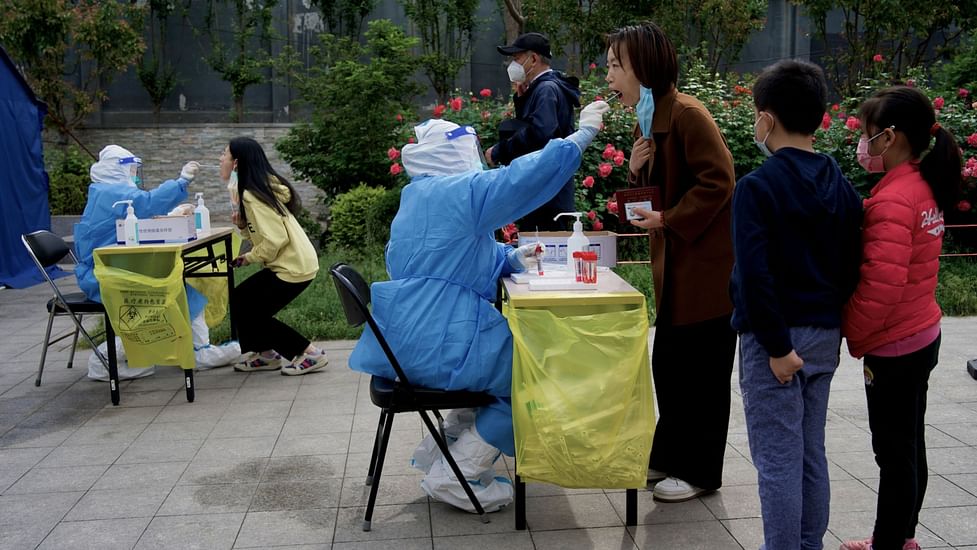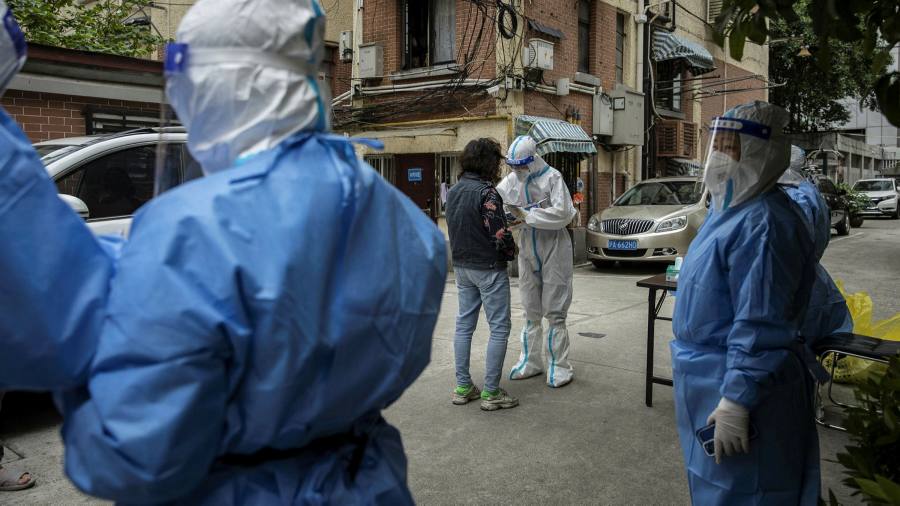China Risks 1.6 Million Deaths If It Abandons COVID-Zero Policy

According to researchers at Fudan University in Shanghai, China is at risk of a “tsunami” of coronavirus infections, which could result in 1.6 million deaths if the government abandons its longstanding COVID Zero policy and allows the highly infectious omicron variant to spread unchecked.
The study, which was published in the journal Nature, discovered that the March virus increased the level of immunity. An omicron wave from overwhelming intensive care capacity, a vaccination campaign would be “inadequate” due to low vaccine rates among the elderly and the country’s reliance on less effective, domestic shots.
Without the mass lawsuits and severe blockades of the country, the spread of omicron could have led to 112.2 million symptomatic cases, 5.1 million hospitalizations, and also 1.6 million deaths, according to the study, with the largest increase occurring between May and July. Shanghai has been closed for nearly six weeks due to China’s largest coronavirus outbreak, but the virus continues to spread.
The government has dismissed criticism of its zero-COVID strategy, saying it remains the best option. According to a letter published last Friday by a team of city medical experts, publication According to The Lancet, the lock down was unavoidable due to Shanghai’s central role in the national economy.
On Tuesday, Shanghai recorded 1,487 new infections, down from 3,014 on Monday. Outside of quarantine, no cases have been discovered. Authorities have stated that three consecutive days of no community spread are required before they will begin easing the restrictions that have kept millions of people confined to their homes for more than a month.
On Tuesday, Beijing reported 37 cases, down from 74 on Monday.
The study, which mirrors earlier modeling from Peking University, comes as World Health Organization Director-General Tedros Adhanom Ghebreyesus urges China to reconsider its zero-tolerance policy, claiming that it no longer makes sense as the omicron variant spreads and the country’s economy suffers. “Shanghai advantages from its financially beneficial trade position as China’s primary economic hub and open city.”
“This could have inconceivable consequences,” said the team, which included Zhang Wenhong, a COVID-19 treatment consultant to Shanghai authorities. Given the virus’s current behavior and what we have, we do not believe this is sustainable.
Expecting “A shift would be critical,” Tedros said at a Tuesday press conference. Pedro’s remarks are a rare instance of the WHO chief criticizing a member state’s internal COVID policies. He was chastised at the start of the pandemic for showing too much deference to China, where the virus first emerged.
They claim that Shanghai’s “dynamic” zero COVID policies will “overcome weak links in populations’ immunological barriers.” It is noted that approximately 49 million people aged 60 and up in the United States still need to be vaccinated. President Xi Jinping has remained committed to China’s tough COVID strategy, tightening pandemic restrictions in Shanghai and expanding a series of mass tests in Beijing. Amid rising financial consequences and the coming opening up of much of the rest of the world, officials continue to strive for the elusive goal of eliminating COVID-19 cases in society.
According to experts, China will not abandon COVID-Zero until Xi is elected for a record third term. He will seek a second term as the country’s top leader at the Communist Party’s national congress later this year.
Xi and the Party have drawn a lot of political capital from the conflict between the strategy, which is based on a manual of border controls, mandatory quarantines, and repeated mass testing to eradicate all chains of transmission, and the country’s isolation while the rest of the world normalizes and coexists with COVID. With the increasingly stringent measures required to contain outbreaks of more contagious strains, analysts predict that the world’s second-largest economy will miss its annual growth target this year.
New vaccines targeting Omicron variants could be available soon. However, China must overcome vaccine apprehension, particularly among the elderly and vulnerable, they added.
According to a separate comment published in the official journal of the Chinese Center for Disease Control and Prevention and conscripted by senior government health advisor Liang Wannian, dynamic zero-COVID was still required to prevent a “run” on China’s health.
China’s dynamic COVID-zero strategies have won a valuable time window for the future, adding that the country must “seize the opportunity” to develop more drugs and vaccines.
Does China Learn From Its Worst COVID-19 Mistakes?
Since the outbreak in Wuhan in early 2020, the outbreak of Omicron in Shanghai has become the most daunting challenge to the Chinese government and its zero COVID policy.
In Shanghai, the total number of COVID19 positive cases has exceeded 600,000. At the height of the spread of COVID19 in Shanghai in mid-April, daily cases exceeded 27,000. As a result, Shanghai has recorded more than 500 deaths since the outbreak began in March, making it the deadliest outbreak in China since the outbreak in Wuhan.
The central government has paid the most attention to the Shanghai outbreak. Sun Chunlan, the main coordinator of China’s zero COVID policy, has been in Shanghai for more than a month.
To support the zero void campaign, more than 30,000 medical experts and 5,000 military doctors have been dispatched to Shanghai. Xi Jinping told a Politburo meeting on May 5 that China could and should win “the war to defend Shanghai.” Xi also said China must maintain its zero COVID policy indefinitely and “fight” anyone who questions or criticizes it.
The outbreak in Shanghai, on the other hand, has sparked widespread discontent among Chinese citizens. People criticized the Shanghai government’s handling of the outbreak. A video titled “Voice of April” went viral on social media overnight, highlighting the deaths of patients as a result of hospitals denying medical care, draconian blockades, and the collapse of the food delivery system. Government efforts to censor the video have heightened public outrage.
Many people have become politicized overnight, refocusing their criticisms on the government’s efforts to “suppress the truth” and “shut people’s mouths.” Moreover, the government’s lack of credibility has become a popular target. Shanghai’s government has arrested two men for “spreading the rumor” that “Shanghai will be closed for seven days.”
On March 23, only five days before the official lockdown on March 28, Two days before the official blockade, on March 26, a Shanghai official said at the town hall government press conference that “Shanghai will not close” because of its critical economic role.
For many, the prolonged blockade has been a slap in the face of the Shanghai government. As a result, the Shanghai epidemic has become a huge public relations disaster for the government. The Shanghai outbreak is similar to the Lin Biao Incident in that, while it did not cause immediate political upheaval, it did serve as a moment of political mass awakening and create widespread cynicism, which could undermine the regime in the long run. 
The similarities between Li’s case and that of Shanghai show that the Chinese government has not learned from its biggest mistake during COVID-19: the failure of the rule of law. The Chinese legal system is full of ambiguity and vagueness, which allows for abuse.
The government often actively exploits these loopholes and enforces the law in its interests. The term “latent rules” in China reflects this duality between the law on paper and the law in practice. Because the implementation of laws is frequently self-contradictory, the prevalence of these latent rules becomes a widespread social justice issue.
For example, law enforcement agencies often resort to “minor infractions”, which are loosely defined crimes that can be applied to a variety of activities, to silence human rights lawyers, social activists, and independent journalists. Commonly used pocket offenses include “spreading rumors,” “causing disturbances,” and “inciting the subversion of state power.”
Because the government can stretch the definition to fit its needs, these pocket crimes undermine the legitimacy of the Chinese legal system. Law enforcement agencies can selectively enforce the law and punish those who cause trouble.
The law has lost all claim to justice and impartiality as the government repeatedly uses it for political repression. Li Wenliang’s case has come to symbolize the latent rules of the Chinese legal system and is a compelling example of how pocket crimes undermine the credibility of Chinese law.
One solution would be to use the interpretative judicial power of the Supreme People’s Court (SPC) to correct this legal failure. The primary function of the CPS is court interpretation; it is a “derivative law” which specifies how the provisions of primary law are to be applied to particular cases.
According to the “Provisions of the Supreme People’s Court on the Judicial Interpretation Work,” published in 2007, the role of judicial interpretation is to resolve “specific issues concerning enforcement in the procedural activity of people’s courts.”
It is a binding guideline for lower courts on “the specific application of a particular law in the trial”. work or the application of the law in the trial of cases of a certain category or type of problem.
In other words, the SCC uses judicial interpretation to define ambiguous legal terms and guide legal applications. By clarifying legal ambiguities and setting law enforcement boundaries, the SPC can thus eliminate pocket crimes through judicial interpretation. By filling in these gaps, the Chinese judicial system can finally free itself from “latent rules” and regain its impartiality.
However, the Chinese government has compelling reasons to oppose this legal reform. If the leadership continues to view the law as a tool of oppression rather than the rule of law, eliminating pocket crimes will only impede its efforts at social control.
Government special interest groups, such as law enforcement, may also oppose the change because it diminishes and limits their previously unchecked power. However, such a reform would increase government transparency and rein in the government’s predatory behavior, restoring its lost credibility and legitimacy.
Many academics saw the Wuhan COVID-19 outbreak and Dr. Li Wenliang’s death as the Chinese Communist Party’s “Chornobyl moment”. The party averted disaster by imposing a strict blockade to effectively stop the spread of the disease. Two years later, the outbreak in Shanghai shows that the government cannot continue to dodge the bullet indefinitely.
As one old Chinese proverb goes, “one can hide on the first day, but not for 15 days” (,). Unless and until the Chinese government resolves the inconsistencies in its legal system, the ghost of such “Chornobyl moments” will haunt Chinese leaders.
edited and proofread by nikita sharma



